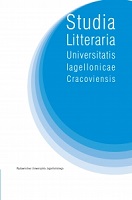Les « reliques cendreuses » de la Ville éternelle. Mélancolie et espoir dans Les Antiquités de Rome de Joachim Du Bellay
The “reliques cendreuses” of the Eternal City. Melancholy and Hope in Antiquités de Rome by Joachim Du Bellay
Author(s): Dorota SzeligaSubject(s): Studies of Literature, French Literature, Health and medicine and law, 16th Century
Published by: Wydawnictwo Uniwersytetu Jagiellońskiego
Keywords: Joachim Du Bellay; Rome; melancholy; hope; sonnet;
Summary/Abstract: During his stay in Rome (1553–1557), Joachim Du Bellay composed the collection of sonnets Les Antiquités de Rome, often overshadowed by the more famous Les Regrets. However, the charm of the poems dedicated to the eternal city, and the history of its greatness and fall, is increasingly appreciated. The poet consistently describes the impressions of a sixteenthcentury visitor contemplating the image of the ancient city from which only ruins seem to have remained. The mood of melancholy is built by a specific construction of images and appropriately selected vocabulary. It is a vision of the city turned into ruin, where even the honor is turned into ‘ashes’, and the only remnants of the past glory is its name. However, the poet does not want to leave the reader in a mood of despondency, and carefully interweaves melancholic and optimistic motifs: traces of the greatness of ancient Rome have survived in the finest literary works, and Du Bellay himself emphasizes that he is the first French poet to describe the glory of the eternal city. This is also important because the collection is dedicated to King Henry II and is probably conceived to show him the path that France should follow in striving for the perfection of the Roman empire, while avoiding its weaknesses. Therefore, the collection is not only a melancholic reminiscence of ancient Rome, but also a canzoniere dedicated to the beautiful city, where one can find inspiration to build France in the spirit of Gallicanism.
Journal: Studia Litteraria Universitatis Iagellonicae Cracoviensis
- Issue Year: 17/2022
- Issue No: 2
- Page Range: 151-162
- Page Count: 12
- Language: French

